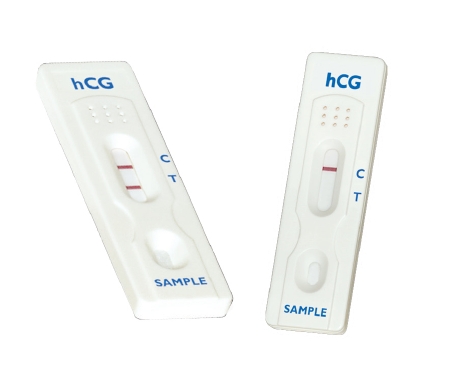
Pregnancy testing is a process used to confirm whether a woman is pregnant or not. There are two main types of pregnancy tests:
Urine Test: This is the most common and easily accessible type of test. It works by detecting the presence of a hormone called human chorionic gonadotropin (hCG) in the urine. Most at-home pregnancy tests are urine tests that come in the form of test strips or digital devices. These tests are usually accurate if taken correctly, typically around the time of a missed period.
Blood Test: This type of test is typically performed by healthcare professionals and can either be a qualitative blood test or a quantitative blood test.
- Qualitative blood tests determine the presence or absence of hCG in the blood and provide a "yes" or "no" answer regarding pregnancy. These tests can usually detect pregnancy earlier than urine tests.
- Quantitative blood tests measure the exact amount of hCG in the blood. They are more sensitive and can detect pregnancy earlier than both urine and qualitative blood tests. They are also used to monitor the progression of hCG levels during early pregnancy or in certain medical situations.
It's important to note that the accuracy of pregnancy tests can vary depending on factors such as the timing of the test, the sensitivity of the test, and how it is performed. For the most accurate results, it's recommended to follow the instructions provided with the test or consult a healthcare professional.




 Adult Diapers
Adult Diapers
 Air Management
Air Management
 Alcohol Tests
Alcohol Tests
 Bandages
Bandages
 Cholesterol Tests
Cholesterol Tests
 Consumables
Consumables
 Cotton Products
Cotton Products
 Drug Tests
Drug Tests
 First Aid Kits
First Aid Kits
 Glucose Tests
Glucose Tests
 Hemoglobin Tests
Hemoglobin Tests
 HIV Tests
HIV Tests
 Intravenous
Intravenous
 Lancets
Lancets
 Linen Savers
Linen Savers
 Measuring & Monitoring Machines
Measuring & Monitoring Machines
 Mobility
Mobility
 Orthopeadics
Orthopeadics
 Packaging & Storage
Packaging & Storage
 Pregnancy
Pregnancy
 Safety Wear
Safety Wear
 Supplements
Supplements
 Tapes
Tapes
 Dental Care
Dental Care
 Ultrasound
Ultrasound
 Urinalysis
Urinalysis
 Wound Dressing
Wound Dressing